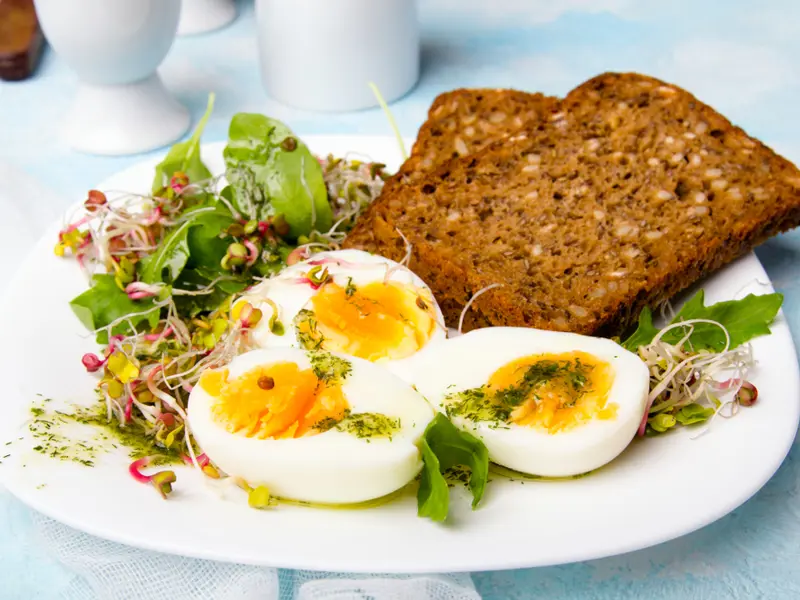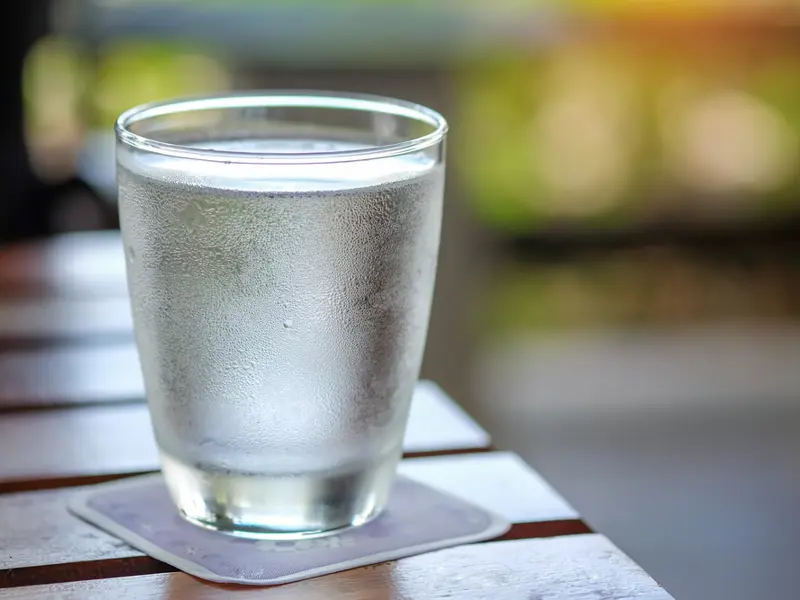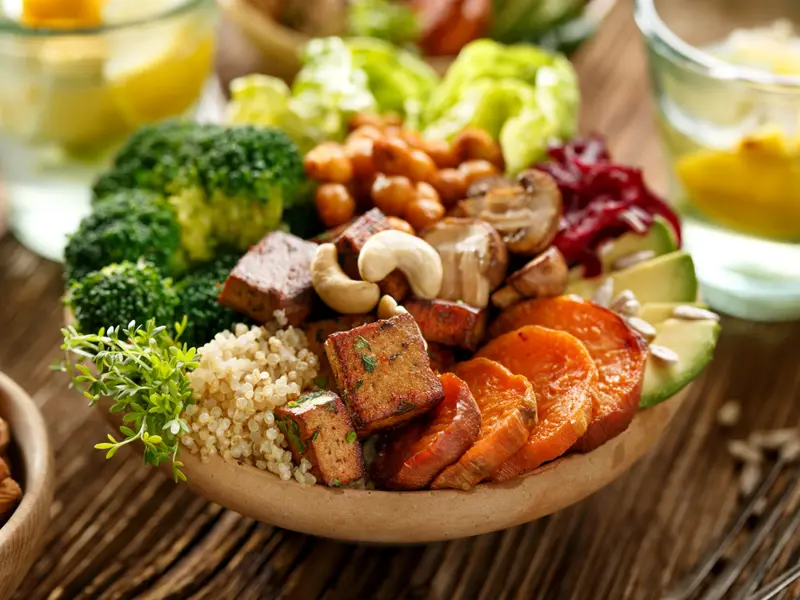Eating a meal with starchy foods like pasta or potatoes and some protein like chicken or fish before you head out won’t stop you getting drunk but will help slow down how fast your body absorbs alcohol, which may make you feel less drunk and could help prevent a hangover.
Going to university is an exciting time, but it can also be a time of change. You will have more choice over what you eat and the chance to take part in new social experiences and discover new food cultures, but also a limited food budget.
Eating a healthy diet without running down your student loan or wasting valuable studying (or socialising) time can be challenging. Studies show that university students drink more alcohol, eat more sugar and eat fewer fruit and vegetables than they should.
Yet, what you eat and drink can have an impact on your body and mind in countless ways. Your diet can also influence the environment and climate change. What’s more, a healthy diet is a life skill, making university a great place to learn how to do it.
Taking time to eat well and having a basic knowledge of eating healthily in a budget-friendly and convenient way that is also more sustainable for our planet can help you get the most out of your university experience. This can help create healthy eating habits, for Freshers week and beyond!
A healthy and sustainable diet for the student budget
Although money may be tight and you can help make sure your body gets all the nutrients it needs to work well from day to day by having a healthy, balanced diet.
Healthy eating is not just about eating less sugar, salt or saturated fat but also about what we should be eating more of, like fruit, vegetables and fibre. Everyone is different and there is no one magic diet or the need for all-or-nothing approaches. You can adapt the principles of healthy eating to suit you.
Food waste is an important issue to consider for both your budget and the environment. It is estimated that food losses and waste could contribute as much as 10% of greenhouse gas emissions. In the UK, the food we throw away at home is the biggest source of food waste.
Here you can find some advice and tips for how to shop, cook and eat in a way that is better for you, your pocket and the planet. For further information read our page on eating healthily and sustainably.
Shop smart
Our tips may help you to stop spending the extra money on campus!
Eating healthily can be a challenge if you are shopping on a budget, but you can make your money go further and buy some lower-cost nutritious foods.
Use any freezer space you have wisely for saving your leftovers - don’t forget to let the food cool first! Freeze food in one-portion containers, making it easier to defrost a meal when you are ready to eat.
Alessandra Marchi, Nutrition Scientist, Recent Graduate
Make a shopping list and stick to it!
Planning your meals can help you cut down on food waste and save money.
Work out exactly what you need to buy. Budgeting is a big part of student life, and this includes working out how much a week you can spend on food and drink. You can reduce the temptation to buy foods you don’t need by planning your meals at the end of the week for the week ahead.
Cook tasty, healthy and affordable meals – for you and others
Cooking is a valuable life skill for university and beyond and is something you can do for yourself but also together with your housemates or friends to have a break from studying! You may find you learn a lot about different foods and cultures as well – food often has many stories, and food can be the basis of interesting topics of conversation including politics, food movements, health and history.
Batch cooking is an excellent way of having ready-made meals for your week ahead. Get your housemates involved so you can all share the costs of the food shop and cook together to make things more fun!
Cooking with your housemates can help save you money - sometimes on a Saturday night we would all make a “fakeaway” meal together such as fajitas or pizza before going out.
Leah Corper, Nutrition Scientist, Recent Graduate
What about vegetarian or vegan diets?
If you or any of your housemates are vegetarian or vegan, then there are certain nutrients, like iron and calcium, which you might need to pay a bit more attention to when planning your meals. Find out more by reading our page on healthy eating for vegetarians and vegans.
University Kitchen Survival Guide
Some ideas of the student store cupboard essentials you might want to stock up with during that first big shop!
Hydration
We need enough fluid for our bodies to function properly. You should aim to drink about 6-8 glasses of fluid each day (alcohol doesn’t count). Water is a good choice because it hydrates you without giving you extra calories or harming teeth and is free from the tap!
Young people get a lot of free sugars (the type of sugars that we all need to cut down on) in their diets from sugars-sweetened drinks (such as fizzy drinks, squash and energy drinks). Try to drink less of these, and go for water, lower-fat milk and ‘no-added-sugars’ versions instead.
Tea and coffee count towards your fluid intake but be careful not to overdo it on the caffeine – try not to have more than four cups of instant coffee or five cups of tea a day (up to 400mg of caffeine a day). Too much caffeine can interrupt your sleep and cause anxiety, and in the long term may also increase your blood pressure and risk of an irregular heartbeat.
Energy drinks
You may be tempted to drink energy drinks during revision or exam time. Whilst energy drinks can give you a quick boost, in the long-term, drinking lots of these drinks can make you feel irritable and affect your sleep because of the levels of caffeine they have.
Most evidence suggests that drinking a lot of energy drinks can also lead to negative health effects such as high blood pressure, poor mental health effects and weight gain. Most of these effects are suggested because of high levels of sugar and caffeine.
Alcohol FAQs
Does eating a meal before a night out drinking stop me getting drunk?
What can I do to stay safe on a night out?
- Don’t drink too quickly and know your limits – everyone is different so try not to keep up with everyone else.
- Drinking water or a non-alcoholic drink between alcoholic drinks won’t make you less drunk but can help you pace yourself and may reduce your hangover symptoms.
- Have a plan for how you are going to get home safely so you don't have to make a decision at the end of the night.
- Look out for others too – keep an eye on your friends if they have drunk too much and stick together at the end of the night.
What counts as binge drinking?
Binge drinking is when you drink a lot of alcohol in a short space of time.
Drinking a lot of alcohol quickly can damage your health and increase your risk of alcohol poisoning. You may be more likely to take risks and have accidents that cause injuries, which can even cause death in some cases.
How do you cure/prevent hangovers?
The most common hangover symptoms are headache, nausea, tiredness and dehydration. Drinking alcohol causes your body to lose more water than normal. Drink water when you get home and keep a glass of water by the bed. Drinking plenty of water the day after a night out will also help you rehydrate.
If you wake up with a hangover, then you might be more likely to miss lectures or seminars, which could eventually have an impact on your academic performance.
What are the alcohol guidelines?
If alcohol is going to be a part of your life at university, remember that it’s recommended not to drink more than 14 units of alcohol a week (equal to 6 pints of 4% beer or 6 glasses of 13% wine).
This should be spread across the week with several alcohol-free days, rather than the units being saved up for one night out.
Remember, some types of beer or wine may be stronger so will have more units. For example, stronger premium lagers can be between 5% and 7% and some stronger wines can be 14% or more.
Regularly drinking too much alcohol can damage your health and increase your risk of long-term diseases like cancers, liver disease and heart disease and stroke. Drinking alcohol can also increase your risk of developing mental health problems, including self-harm and alcohol dependence














